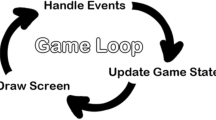Abstract
Computer programming is a multidisciplinary course that promotes critical thinking and problem-solving skills. By learning how to program, students learn how to transform abstract problems into logical steps of instructions as a solution. Still, learning a programming language is challenging especially if students lack the prerequisites. This paper discusses the potential of using gamified challenges to teach and learn fundamental concepts of Python programming language. To this end, a recently developed serious game is presented and discussed. The proposed game offers a complete course with different tests ranging from simple quizzes to the most complex puzzles. The game effectiveness is validated by comparing to what extent it respects some learning principles of games for learning.
Access this chapter
Tax calculation will be finalised at checkout
Purchases are for personal use only
Similar content being viewed by others
References
Gouws, L.A., Bradshaw, K., Wentworth, P.: Computational thinking in educational activities. In: Proceedings of the 18th ACM Conference on Innovation and Technology in Computer Science Education—ITiCSE ’13, p. 10 (2013)
Ruby Warrior—Popular Free Ruby Programming Tutorial Game [Online]. Available: https://www.bloc.io/ruby-warrior#/. Accessed 5 Mar 2019
Miljanovic, M.A., Bradbury, J.S.: Robot on! In: Proceedings of the 5th International Workshop on Games and Software Engineering—GAS ’16, pp. 33–36 (2016)
Esper, S., Foster, S.R., Griswold, W.G., Herrera, C., Snyder, W.: CodeSpells. In: Proceedings of the 14th Koli Calling International Conference on Computing Education Research—Koli Calling ’14, pp. 05–14 (2014)
CodeSpells, CodeSpells | Craft Custom Spells [Online]. Available: https://codespells.org/. Accessed 10 Sept 2017
Movetheturtle, Move the turtle—programming for kids on the iPhone and iPad [Online]. Available: http://movetheturtle.com/. Accessed 12 Sept 2017
Code Combat, CodeCombat—learn how to code by playing a game [Online]. Available: https://codecombat.com/. Accessed 5 Sept 2017
Wilson, C., Cameron, : Hour of code. ACM Inroads 5(4), 22 (2014)
Gee, J.P.: What Video Games Have to Teach Us About Learning and Literacy. Palgrave Macmillan (2007)
Author information
Authors and Affiliations
Corresponding author
Editor information
Editors and Affiliations
Rights and permissions
Copyright information
© 2020 Springer Nature Singapore Pte Ltd.
About this paper
Cite this paper
Yassine, A., Berrada, M., Tahiri, A., Chenouni, D. (2020). A Serious Game for Teaching Python Programming Language. In: Bhateja, V., Satapathy, S., Satori, H. (eds) Embedded Systems and Artificial Intelligence. Advances in Intelligent Systems and Computing, vol 1076. Springer, Singapore. https://doi.org/10.1007/978-981-15-0947-6_37
Download citation
DOI: https://doi.org/10.1007/978-981-15-0947-6_37
Published:
Publisher Name: Springer, Singapore
Print ISBN: 978-981-15-0946-9
Online ISBN: 978-981-15-0947-6
eBook Packages: Intelligent Technologies and RoboticsIntelligent Technologies and Robotics (R0)




